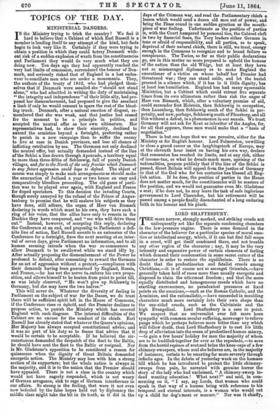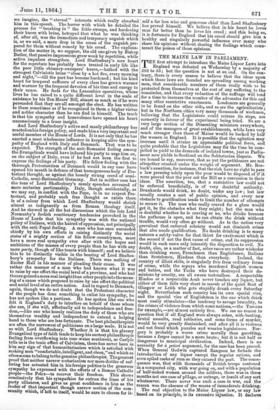LORD SHAFTESBURY. T HE more narrow, strongly marked, and striking creeds
not unfrequently act like the separate condensing chambers in the low-pressure engine. There is some demand in the character of the believer for a particular species of moral emo- tion or intellectual energy, which, if it can but find full scope in a creed, will get itself condensed there, and not trouble any other region of the character ; nay, it may be the very intensity and expansive power of certain elements of feeling which demand their condensation in some secret corner of the character in order to restore the equilibrium. There is no doubt that the predestinarian and fatalist creeds among Christians,—it is of course not so amongst Orientals,—have generally taken hold of races more than usually energetic and disposed to claim the uttermost freedom ; and that the more equally distributed and homogeneous creeds which have no startling excrescences, no paradoxical pressures at fixed points on the emotion s,—such as the Roman Catholic, and the Arminian, and the rationalistic,—have succeeded in moulding characters much more certainly into their own shape than the one-sided creeds, such as the Calvinistic and the high Evangelical. Lord Shaftesbury is a case in point. We suspect that no universalist ever felt more keen sympathy with common secular suffering, more eager to relieve pangs which he perhaps believes more bitter than any which will follow death, than Lord Shaftesbury is to cast his little drop of alleviation into the ocean of predestined human misery, —to gain a few hours' holiday for men the majority of whom are to be huddled. together for ever as the reprobate,—to save from the horrid regimen of soot and brine the knee-caps of a few chimney-sweepers, whose soul she believes are, in the majority of instances, certain to be smarting far more severely through infinite ages. In the debate of yesterday week on the humane bill which be has introduced to protect the little chimney- sweeps from pain, he narrated with genuine horror the story of the lady who had exclaimed, "A chimney-sweep in- deed wanting education ! What next ?" and said, in com- menting on it, "I say, my Lords, that woman who could speak in that way of a human being with reference to his temporal and eternal interests, is a woman who would cut up a child for dog's meat or manure." Nor was it chiefly, we imagine, the "eternal" interests which really absorbed him in this speech. The horror with which he detailed the process for "breaking in" the little sweeps, and hardening their knees with brine, betrayed that what he was thinking of, after all, was the immediate and temporary anguish which is, as we said, a mere drop in the ocean of the anguish pre- pared for them without remedy by his creed. The explana- tion of the matter is, we suppose, the old one given by Bishop Butler, that passive impressions grow weak by repetition, while active impulses strengthen. Lord Shaftesbury's sore heart for the reprobate has probably been treated in early life like the poor little chimney-sweepers' knees,—bathed with the strongest Calvinistic brine "close by a hot fire, every morning and night,"—till the part has become hardened ; but his kind heart for temporal sufferers of every class has grown warmer and warmer by the frequent devotion of his time and energy to their cause. He feels for the Lancashire operatives, whose lives be has raised to a quite different level in the scale of existence by his Ten Hours' Bill, almost as much as if he were persuaded that they are all amongst the elect. He has written to them sometimes as if he recognized in them a higher virtue and nobler character than he can find in himself. The truth is that his sympathy and benevolence have opened his heart unconsciously to a truer insight.
And Lord Shaftesbury's active and manly philanthropy has reacted onhis foreign policy, and made him a very important and useful member of the House of Lords. It is not only that he has exerted a most wholesome influence in keeping alive the sym- pathy of England with Italy and Denmark. That was to be expected. The strength of the anti-Romanist feeling among the Evangelicals would have induced his party to urge him on, on the subject of Italy, even if he had not been the first to express the feelings of his party. His fellow feeling with the thorough Protestantism of Denmark would in any case have opened his mouth in defence of that homogeneous body of Pro- testant thought, as against the loosely strung creed of semi- Catholic, semi-Rationalist Germany. But in neither ease has the tone of Lord Shaftesbury's manly speeches savoured of mere sectarian partizanship. Italy, though accidentally, as we may say, in conflict with the Pope, is in no respect Pro- testant, and probably such free thought as exists there is of a Colour from which Lord Shaftesbury would shrink almost as indignantly as from Roman theology itself. And he showed in all the hot discussions which the late Lord Normanby's foolish reactionary tendencies provoked in the House of Lords that his sympathy was with the national policy of Italians, with the hatred of oppression, not principally with the anti-Papal feeling. A man who has once succeeded chiefly by his own efforts in raising distinctly the social status of a mighty section of his fellow-countrymen, must have a more real sympathy ever after with the hopes and ambitions of the masses of every people than he has with any mere party, though of like tenets with himself; and we believe this to be distinctly visible in the bearing of Lord Shaftes- bury's sympathy for the Italians. There was nothing of Exeter Hall in his manner of pleading their cause. It was rather the manner of a man who had known what it was to raise by one effort the social level of a province, and who had thence gained a more real insigh t than other people into the mean- ing of a cause which proposed to raise by one effort the political and social level of an entire nation. And in regard to Denmark, again, though we do not doubt that the Protestant character of the people has done something to enlist his sympathy, he bas not spoken like a partizan. He has spoken like one who felt it England's duty to interfere on behalf of those whom she can, if she will, effectually aid to independence and free- dom,—like one who keenly realizes the duty of those who are themselves wealthy and independent to extend a helping hand to those who are less fortunate. The best philanthropists are often the narrowest of politicians on a large scale. It is not so with Lord Shaftesbury. Whether it is that his gloomy Evangelical type of faith tends to keep his earnest philanthrOpic feeling from overflowing into rose-water sentiment, as Carlyle tells us is the tonic effect of Calvinism, there has never been in him any sign of that humanitarianism which is satisfied with making men "comfortable, intelligent, and clean," and which so often seems to belong tothe genuine philanthropist. The greatest proof that neither narrow sectarianism nor mere dislike of suf- fering has actuated him in his foreign politics is the generous sympathy he expressed with the efforts of a Roman Catholic people—the Poles—to recover their freedom. This shows conclusively that his sympathies far outrun the lines of his party alliances, and gives us great confidence in him as the leader of that important though narrow section of the com- thunity which, if left to itself, would be sure to choose for it- self a far less wise and generous chief than Lord Shaftesbury has proved himself. We believe that in his heart he loves man far better than he loves his creed ; and this being so, it is fortunate for England that his creed should give him a healthy and singularly powerful influence over many who share his opinions without sharing the feelings which coun- teract the poison of those opinions.





























 Previous page
Previous page